6 Smart Tips to Transition from Traveler to Resident Abroad
Article and photos by Jonathon
Engels
10/31/2015
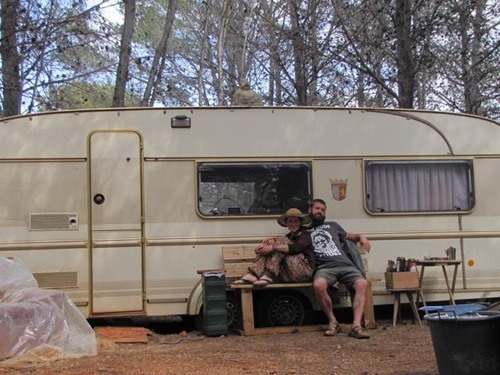 |
| This isn’t actually my caravan, but rather was a temporary house in Spain while I was volunteering. I’ve managed to live in caravans, palm-thatched huts, lofts, a tipi, and an earth bag home through work-trades. |
I was there once, too: Dreaming. For years, I managed to fill my life with graduate school and work and romantic relationships and cars and furniture — things which would keep me “grounded” (a word semantically at work in so many ways here). It wasn’t that life wasn’t fulfilling, but it wasn’t the dream.
Like many people, though, the other side — of the Atlantic, the Pacific, the border — just felt foreign and scary. The prospect of traveling was hard enough, with no grasp of the language, uncertainty about decorum, and so much to do at home. How was I ever supposed to actually plunge into a life abroad, even for a year?
Funny thing how all the cards just fall as they must sometimes, and eleven years later (all of them abroad), I find myself sitting in a wooden hut over a tropical river in Central America, doling out tips for how I got here. The honest answer as to how I arrived here is a lot of luck. The useful answer is that sometimes you can make your own luck.
1. Ditch the Schedule
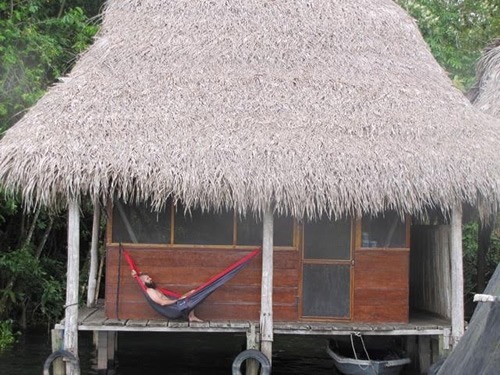 |
| Our home at the time of writing this article, while my wife and I are taking time to look for some land in the area. We are paying next to nothing for rent, have little else to do each day, and no concrete plans for what happens next. |
One of the most unfortunate things I see from travelers who are hooked on life abroad is a confining schedule. Sometimes, they’ve taken summer off. Often, they are on year-long, round-the-world trip, constantly attending to an itinerary. I’m not saying this sort of long-term travel can’t be right for people, but just as often, the thought of going back home is a huge letdown.
For travelers hoping to find something out there in the world, it’s important to allow a chance for real possibilities to come to fruition. Having to be back at work by such and such date isn’t going to permit things to unfold, or knowing the flight to the next country is in two weeks or two months means that experiencing this country is bound by limitations. But, everything becomes different after ditching the schedule.
Once your schedule is clear, you can go anywhere or (more relevantly) stay anywhere. Suddenly, I kid you not, job opportunities and the means to put down roots for a while start happening. When you discover that you want to stay somewhere, you’ll find a way to make it work. It happens, more often than not, with minimal effort.
2. Further Your Interests
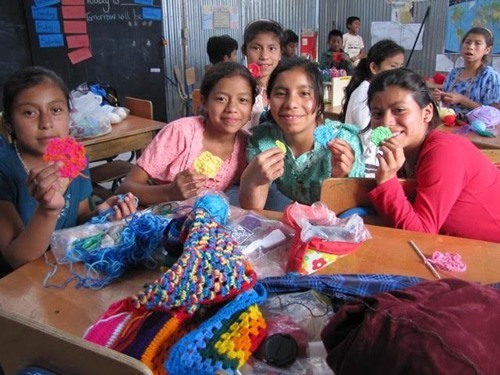 |
| My wife Emma loves arts and crafts and went through a serious crochet phase. To further her interest, she came up with an after-school program, volunteering with a school in Guatemala, teaching the kids and making yarn-bombs for the community. |
Most of us who travel choose our destinations based on things we find of particular interest. It might be scuba diving or hiking or biking, beaches or mountains or quietude. Some of us love to dip into culture and have delved into one in particular. It could be architecture, yoga, mysticism, or awesome food. It doesn’t matter.
What I’ve learned is that, when something interests us, there is often the opportunity to push it into something more than a hobby. All scuba instructors were once wide-eyed, first-time divers blown away by the pretty fishes, just as tour guides and trip organizers would have at some point not known a damned thing about that church they are showing you or the river you’re sailing along together.
Take whatever interests that have brought you to a place and explore whether or not they have the capacity to keep you at that location. Yogi spots need an abundance of yoga teachers. Mountains need qualified folks to take tourists on camping trips. Beach bars need sun-tanned bartenders. NGOs need full-time volunteers. It’s a viable chance to do a job you really want to do in a place you really want to be.
3. Practice Minimalism in Your Life
 |
| In addition to practicing minimalism in your life before leaving home, try to accept simpler means of living abroad for a year or less. Here was our kitchen for nearly a year while living in Antigua. |
We all get attached and cling to material things, habits, and conveniences, but in the end, if we are dreaming of being somewhere else then such forms of security clearly aren’t providing fulfillment. Then, when it’s time to leave for the big trip, we are loaded with a ton of baggage from back home rather than what we can carry in a backpack. Money is a big deal, but it’s much better when the big deal isn’t restricted by loans and payments.
Before you leave, get rid of possessions that will require returning at address and continual payments. Get realistic about what can and can’t be replaced. Sure, it’s a pain to find a new car, but it’s a bigger pain to try to pay for one or sell one while you are abroad. If you are worried about needing it if things go awry, put aside a little savings from the sale to allow you to buy a new one when and if you return home. If not coming home is on the table, a sale makes it an easy choice.
Faulkner is famous for saying, in reference to writing, “Kill your darlings.” In other words, do away with all those flights of fancy in your prose and get it down to what’s important. Well, for those travelers looking to migrate for more than just a vacation, the same advice holds true for your stuff. Keep only what you need. You don’t want a storage room full of sofas and flat screens and home décor to be what brings you home. What’s more, you don’t want to be carrying an impossibly large suitcase.
4. Get Online
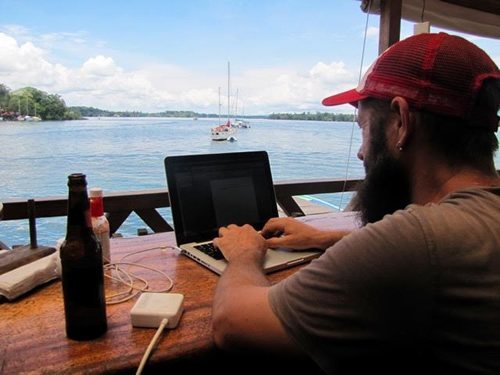 |
| Essentially, I’ve lucked out everywhere I go in finding a place to work due to the fact that writing is an online profession these days. And, lucky for anyone looking to settle abroad, lots of stable careers are still readily available online. |
Writing about the need to be online is almost obsolete, and perhaps ages me a bit, as nearly everyone has gone digital with their bills, banking, correspondence, and conversations. However, it’s wildly useful to take advantage of this technology for those not yet doing so, and for those already in the game, see how well it can be streamlined for practical purposes. The World Wide Web, as its name suggests, is ubiquitous.
When I first moved abroad, video chatting online was still only regularly seen in the movies, and touch screen technology was something I’d only come across in rudimentary form on restaurant computers. Now, it’s a standard part of life everywhere. While many of us are dreaming of lives that allow us to get away from constant connectivity, the virtual mode offered by the web provides a plethora of flexible options for living and working abroad.
Make sure that whatever banking you engage in is online and that any regular transactions you might be making can be performed simply (having a trusted person back home with whom you share your account also helps in times of trouble). The ultimate idea would be to get rid of any and all bills, but if that’s not possible, move towards conducting business via the Internet. And, set up a phone number that works online, such as the Skype service, so that international calls still work and are nearly free.
5. Develop Your Language Skills
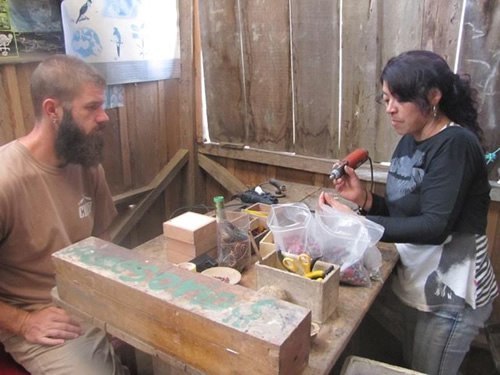 |
| My command of Spanish is always improving. It’s not perfect, or even on par with many others who’ve lived in Spanish-speaking countries for a much shorter period. Even so, the value of being able to communicate as much as I do is incredibly useful. |
One of the first things people ask me about when they find out I’ve lived here is about the language. Often they assume that I’m some sort of polyglot who has moved with linguistic prowess amongst every culture. This is not the case. In actuality, my Spanish gets me by pretty well, and the rest of the time — in Turkey, Russia, Korea, etc. — I communicate with my advanced tourist-level command of the language.
The truth of the matter is that it’s possible to get by with minimal ability to speak the native tongue; however, I had a lot of help. I often worked for schools that would assist me in procuring an apartment, showed me some ropes for the beginner, and handled any major issues. People will be there to help other newbies as well, but it’s just foolish and negligent not to gain some knowledge of the local language.
6. Give the Unknown a Chance
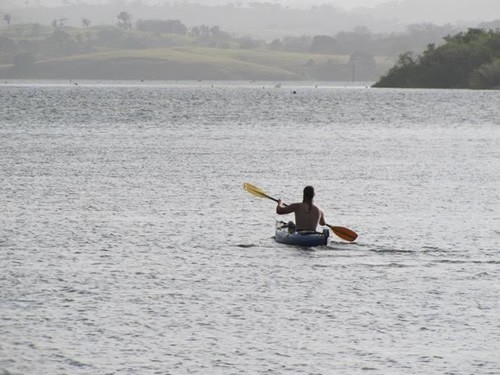 |
| To be honest, I’m just on quick kayak trip around Lake Gatun in Panama. But, I’m doing so with a kayak on the property where I worked for about eight months, as it was a great place to be and there was nothing to motivate me to leave. |
Even for travelers accustomed to going abroad, there is often a strong desire to expatriate, if only for a short time. There is nothing wrong with being a traveler, and there’s nothing wrong with liking to live where you live. However, for those who look starry-eyed at a life abroad there is no reason not to take the plunge. It doesn’t mean renouncing your family and friends. It’s doesn’t mean giving up your citizenship. It just means taking a fairly risk-free chance.
Leave for that next trip without a schedule, purchase an open-ended ticket, plan a loose route to your ultimate long-term destination…maybe. Start it by getting that certification in teaching English or yoga or scuba diving or permaculture. Make things back “home” maintenance-free as possible. Work diligently on learning the language, and not just “please” and “thank you,” but how to handle everyday conversations. Buy a ticket to somewhere you like and see what you discover in a couple months or more.
The dream is alive in many of us. International travelers, especially those that forego the all-inclusive resorts in favor of contact with the actual culture tend to be inveterate dreamers. Those who’ve not yet picked up a passport also dream. Just about everyone I know, at one time or another, has dreamed of living abroad. Why restrict yourself to dreams when all of the resources and opportunities are available and increasingly easier to access?
 |
Jonathon
Engels earned an MFA in creative writing.
He has lived, worked and/or volunteered in seven
different countries, traveling his way through
nearly 40 countries between them. His many interests include permaculture, veganism, and ways to live sustainably.
|
|
